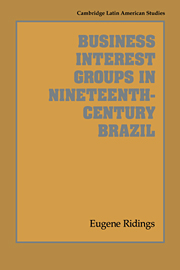Book contents
- Frontmatter
- Contents
- Acknowledgments
- Abbreviations and Usage
- Value of the Mil-reis against the Dollar and the Pound
- Brazil, with cities
- Introduction
- 1 The Genesis of Brazilian Business Interest Groups
- 2 Leadership and Organization
- 3 Influence, Ideology, and Public Relations
- 4 The Export Economy: Agricultural Quality, Markets, and Profits
- 5 The Export Economy: Banking, Credit, and Currency
- 6 The Export Economy: Manpower
- 7 Taxation
- 8 Industrialization
- 9 Communications: Regionalism Perpetuated
- 10 Port Areas and Harbors: Efficiency and Rivalry
- 11 Business Interest Groups and Economic and Urban Integration
- 12 Business interest groups and the Republic
- 13 Conclusion
- Bibliography
- Index
4 - The Export Economy: Agricultural Quality, Markets, and Profits
Published online by Cambridge University Press: 27 October 2009
- Frontmatter
- Contents
- Acknowledgments
- Abbreviations and Usage
- Value of the Mil-reis against the Dollar and the Pound
- Brazil, with cities
- Introduction
- 1 The Genesis of Brazilian Business Interest Groups
- 2 Leadership and Organization
- 3 Influence, Ideology, and Public Relations
- 4 The Export Economy: Agricultural Quality, Markets, and Profits
- 5 The Export Economy: Banking, Credit, and Currency
- 6 The Export Economy: Manpower
- 7 Taxation
- 8 Industrialization
- 9 Communications: Regionalism Perpetuated
- 10 Port Areas and Harbors: Efficiency and Rivalry
- 11 Business Interest Groups and Economic and Urban Integration
- 12 Business interest groups and the Republic
- 13 Conclusion
- Bibliography
- Index
Summary
“The greatest or almost the only economic strength in Brazil resides in agriculture,” remarked the President of the Commercial Association of Pernambuco in 1888. “This is a truth so well-known that it seems pure idleness to repeat it.” This was how the commercial associations and factor groups saw agriculture. The phrase “our only source of wealth” is a leitmotiv in their statements on the subject. As a high customs official explained: “In this country … where manufacturing industry barely struggles to get out of infancy, agriculture is the principal base of private and public fortune, and [being] the thermometer which regulates importation, commerce finds itself tightly linked with it and above all dependent on it.” Business interest groups tried to develop agriculture by improving the quality of exports, expanding export markets, reducing export taxes, arranging cheap credit, and ensuring abundant labor.
As noted, the absence or weakness of agricultural interest groups promoted the role of business interest groups as advocates for agriculture. Commercial associations presumed to speak on behalf of the agriculture of their region, while factor groups represented the sugar or coffee industries. Government ratified the claim of business interest groups to speak for agriculture. National and provincial authorities commonly called on them for suggestions on agricultural development, evaluations of the crop situation in their areas, and remedies for crises. In addition, commercial association and factor group leaders were often appointed to special government committees dealing with agricultural problems. In one case, a committee chosen by the Minister of Finance to evaluate agriculture in the Province of Bahia in 1874 consisted entirely, except for its chairman, of directors of the Commercial Association of Bahia.
- Type
- Chapter
- Information
- Business Interest Groups in Nineteenth-Century Brazil , pp. 93 - 131Publisher: Cambridge University PressPrint publication year: 1994



